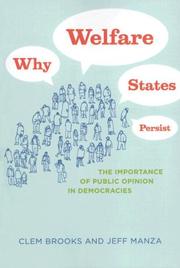| Listing 1 - 10 of 241 | << page >> |
Sort by
|
Book
ISBN: 9060810651 Publisher: Laren Blitz
Abstract | Keywords | Export | Availability | Bookmark
 Loading...
Loading...Choose an application
- Reference Manager
- EndNote
- RefWorks (Direct export to RefWorks)
Book
Abstract | Keywords | Export | Availability | Bookmark
 Loading...
Loading...Choose an application
- Reference Manager
- EndNote
- RefWorks (Direct export to RefWorks)
Book
ISBN: 1412352681 Year: 2006 Publisher: Chicoutimi : J.-M. Tremblay,
Abstract | Keywords | Export | Availability | Bookmark
 Loading...
Loading...Choose an application
- Reference Manager
- EndNote
- RefWorks (Direct export to RefWorks)
Dissertation
Year: 1755 Publisher: Trajecti ad Rhenum [i.e. Utrecht] : Ex officina Joannis Broedelet, Academiae Typographi,
Abstract | Keywords | Export | Availability | Bookmark
 Loading...
Loading...Choose an application
- Reference Manager
- EndNote
- RefWorks (Direct export to RefWorks)
Book
Year: 1968 Publisher: Stockholm : Bonnier,
Abstract | Keywords | Export | Availability | Bookmark
 Loading...
Loading...Choose an application
- Reference Manager
- EndNote
- RefWorks (Direct export to RefWorks)
Book
Abstract | Keywords | Export | Availability | Bookmark
 Loading...
Loading...Choose an application
- Reference Manager
- EndNote
- RefWorks (Direct export to RefWorks)
Book
ISBN: 1108563147 1108683053 1108656420 1108475000 Year: 2018 Publisher: Cambridge : Cambridge University Press,
Abstract | Keywords | Export | Availability | Bookmark
 Loading...
Loading...Choose an application
- Reference Manager
- EndNote
- RefWorks (Direct export to RefWorks)
The concept of providence is embedded in the life and theology of the church. Its uses are frequent and varied in understandings of politics, nature, and individual life-stories. Parallels can be discerned in other faiths. In this volume, David Fergusson traces the development of providential ideas at successive periods in church history. These include the early appropriation of Stoic and Platonic ideas, the codification of providence in the Middle Ages, its foregrounding in Reformed theology, and its secular applications in the modern era. Responses to the Lisbon earthquake (1755) provide an instructive case study. Although confidence in divine providence was shaken after 1914, several models were advanced during the twentieth century. Drawing upon this diversity of approaches, Fergusson offers a chastened but constructive account for the contemporary church. Arguing for a polyphonic approach, he aims to distribute providence across all three articles of the faith.
Providence and government of God --- God --- Christianity --- History of doctrines. --- Providence and government --- Sovereignty
Book
ISBN: 9781441112705 Year: 2012 Publisher: London Continuum
Abstract | Keywords | Export | Availability | Bookmark
 Loading...
Loading...Choose an application
- Reference Manager
- EndNote
- RefWorks (Direct export to RefWorks)
History --- Providence and government of God. --- Philosophy. --- Providence and government of God --- 231.52 --- God --- History, Modern --- 231.52 Goddelijke voorzienigheid --- Goddelijke voorzienigheid --- Philosophy --- Providence and government --- Sovereignty
Book
Year: 1974 Publisher: Paris : Cerf,
Abstract | Keywords | Export | Availability | Bookmark
 Loading...
Loading...Choose an application
- Reference Manager
- EndNote
- RefWorks (Direct export to RefWorks)
Providence and government of God --- Human anatomy --- Providence divine. --- Human anatomy. --- Providence and government of God --- Schepping. --- God. --- Christianity --- Christianity. --- Lactantius, Caecilius Firmianus --- Pater Ecclesiae --- Apologet.

ISBN: 9780226075846 9780226075839 0226075834 0226075842 Year: 2007 Publisher: Chicago : University of Chicago Press,
Abstract | Keywords | Export | Availability | Bookmark
 Loading...
Loading...Choose an application
- Reference Manager
- EndNote
- RefWorks (Direct export to RefWorks)
The world's richer democracies all provide such public benefits as pensions and health care, but why are some far more generous than others? And why, in the face of globalization and fiscal pressures, has the welfare state not been replaced by another model? Reconsidering the myriad issues raised by such pressing questions, Clem Brooks and Jeff Manza contend here that public opinion has been an important, yet neglected, factor in shaping welfare states in recent decades. Analyzing data on sixteen countries, Brooks and Manza find that the preferences of citizens profoundly influence the welfare policies of their governments and the behavior of politicians in office. Shaped by slow-moving forces such as social institutions and collective memories, these preferences have counteracted global pressures that many commentators assumed would lead to the welfare state's demise. Moreover, Brooks and Manza show that cross-national differences in popular support help explain why Scandinavian social democracies offer so much more than liberal democracies such as the United States and the United Kingdom. Significantly expanding our understanding of both public opinion and social policy in the world's most developed countries, this landmark study will be essential reading for scholars of political economy, public opinion, and democratic theory.
Welfare state --- Etat providence --- Public opinion. --- Opinion publique
| Listing 1 - 10 of 241 | << page >> |
Sort by
|

 Search
Search Feedback
Feedback About UniCat
About UniCat  Help
Help News
News